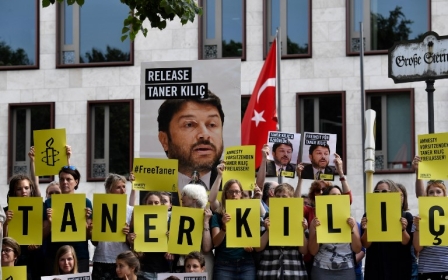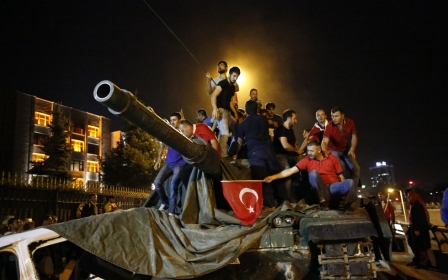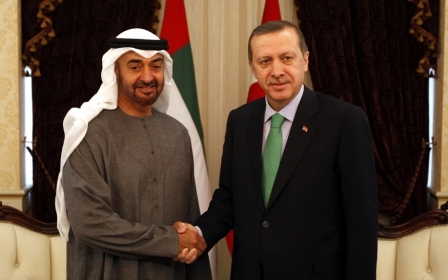Germany warns Turkey of reprisals over refusal to free activist
Germany on Thursday announced it was considering pulling back from investments in Turkey as part of a range of steps in response to Ankara's refusal to address concerns about the imprisonment of a German human rights activist.
German foreign minister, Sigmar Gabriel, said Germany would talk to EU partners about Turkey's aspirations to join the bloc and made clear Berlin could no longer guarantee German corporate investment in Turkey.
He also said he could not envisage talks on expanding the customs union with Turkey and he issued new travel advice which warned of risks in Turkey for Germans.
"We need our policies towards Turkey to go in a new direction... we can't continue as we have. We need to be clearer than we have been until now so those responsible in Ankara understand that such policies are not without consequences," Gabriel said.
The German foreign ministry also updated its travel advice for Turkey.
"People who are travelling to Turkey for private or business reasons are urged to exercise increased caution, and should register with German consulates and the embassy, even for shorter visits," the ministry said in a revised travel guidance.
"Foreign ministry sites are not always informed in a timely manner about the detention of German citizens, and access for consular services is not always ensured," it added.
German Chancellor Angela Merkel's office said the measures announced were necessary and unavoidable.
German companies have either invested in or own 6,000 firms operating in Turkey, generating approximately 60,000 jobs.
The continued detention of human rights activist and German national Peter Steudtner, along with nine other activists, and Ankara's refusal to address German concerns over the arrest, is only the latest in a series of tensions between the two countries.
The Turkish ambassador was summoned to the German foreign ministry on Wednesday and Berlin requested the immediate release of Steudtner. Steudtner and the other rights activists are charged with “abetting an armed terrorist organisation”.
Ten activists were detained on 6 July whilst attending a workshop. A court ruled for the continued detention of six of them on 17 July.
Turkish President Recep Tayyip Erdogan in a news conference at the G20 summit in Hamburg on 8 July had said intelligence suggested that those activists had gathered “to plan and instigate another coup in Turkey”.
The German foreign ministry spokesman on Wednesday called the detentions a “direct Turkish government intervention in judicial proceedings” and Gabriel suggested the arrests were “planned and well prepared in advance”.
The Turkish foreign ministry responded harshly to this summons and called remarks made by the German foreign ministry spokesman and minister “unacceptable”.
“We believe these statements are a domestic investment in the approaching German elections. It has become a trend in Germany (to do this]. They are trying to earn points for themselves,” said Ibrahim Kalin, the presidential spokesman. “They need to sit down and think of how they can rescue themselves from this brain fade.”
Gabriel reportedly cut short a holiday and returned to Berlin to issue his statement, warning of Germany's unwillingness to guarantee the future of corporate investments in Turkey if Ankara continues on the same tack.
The German opposition Social Democrats have also asked for tougher measures against Turkey with the leader of the SPD party Martin Shultz calling “for concrete steps to be taken against Turkey”.
Turkish-German relations have taken a nose dive since the high point of a migrant deal, reached in March 2016, between the EU and Ankara.
Since then Erdogan has likened German and other European leaders to fascists and Nazis after Turkish officials were barred from campaigning in those countries in the run-up to a referendum on switching to a presidential system in Turkey.
Turkey also denied German MPs access to the Incirlik airbase, from where coalition operations against the Islamic State group are carried out. Berlin decided to withdraw its troops from the base as a consequence.
Last week Turkish authorities also denied German MPs permission to visit their troops at a NATO airbase in the central Anatolian city of Konya.
On Thursday, the online campaigning organisation Avaaz announced that one of its staff members had been detained by Turkish police.
Avaaz released an online petition shortly after calling for support for Ozlem Dalkiran and other imprisoned activists in Turkey from EU chief of foreign affairs Federica Mogherini and other EU foreign ministers:
"Please exert every possible lever of influence to secure the freedom of Avaaz friend and colleague, Ozlem Dalkiran, and the five other human rights defenders unjustly imprisoned in Turkey ahead of the high-level political meeting in Brussels between the EU and Turkey," read the petition.
"Turkey's brutal crackdown on civil society and human rights activists runs contrary to everything that the EU stands for! We can't turn a blind eye on it."
New MEE newsletter: Jerusalem Dispatch
Sign up to get the latest insights and analysis on Israel-Palestine, alongside Turkey Unpacked and other MEE newsletters
Middle East Eye delivers independent and unrivalled coverage and analysis of the Middle East, North Africa and beyond. To learn more about republishing this content and the associated fees, please fill out this form. More about MEE can be found here.




